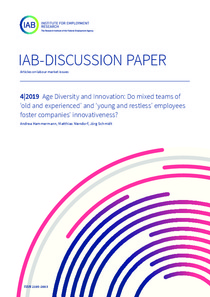Age diversity and innovation: do mixed teams of old and experienced and young and restless employees foster companies innovativeness?
"In Germany, the labour force is ageing rapidly. At the same time, age heterogeneity within companies is rising. The literature on diversity argues that heterogeneity can have a positive as well as a detrimental effect on team outputs. Our paper sheds light on the impact of age diversity on the...
| Main Authors: | , , |
|---|---|
| Institution: | ETUI-European Trade Union Institute |
| Format: | TEXT |
| Language: | English |
| Published: |
Nürnberg
2019
IAB |
| Subjects: | |
| Online Access: | https://www.labourline.org/KENTIKA-19306667124911248499-age-diversity-and-innovation-d.htm |
| Summary: | "In Germany, the labour force is ageing rapidly. At the same time, age heterogeneity within companies is rising. The literature on diversity argues that heterogeneity can have a positive as well as a detrimental effect on team outputs. Our paper sheds light on the impact of age diversity on the likelihood of a company to create product or process innovations. Based on our analysis of the Linked Employer-Employee-Data from the Institute for Employment Research (IAB) over the 2009-2013 period, we focus on different indicators of age diversity within a company's workforce (variety, separation and disparity). We find that a rise in the average age of a company's workforce has a negative impact on innovation, but age diversity measured by the standard deviation of age or the average age gap increases the probability of a company to create innovations. In addition, the uniformity of the age distribution does not affect innovativeness. Different results for age and tenure diversity suggest a higher importance of generalised human capital for creativity processes compared to company-specific knowledge gained during employment within a company." (Author's abstract, IAB-Doku) ((en)) |
|---|---|
| Physical Description: | 31 p. Digital |

